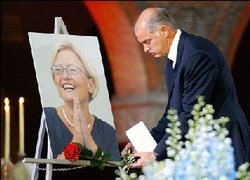George Papandreou
|
|
For George Papandreou's grandfather, also called George Papandreou, see George Papandreou, senior.
Ac.georgepapandreou3.jpg
Giorgos (or George) Andreas Papandreou (Greek: Γιώργος Α. Παπανδρέου) (born June 16, 1952 in St. Paul, Minnesota), is a Greek politician and was Foreign Minister of Greece from 1999 to 2004. The son and grandson of Greek prime ministers, Papandreou became the leader of the Panhellenic Socialist Movement (PASOK) party in February 2004. On 7 March Papandreou led PASOK to defeat in the Greek national elections.
| Contents |
Background
Papandreou was born in St Paul, Minnesota, in the United States, where his father, Andreas Papandreou, then held a university post. His mother is American-born Margaret Papandreou, nee Chant. He was educated at schools in Toronto Canada, at Amherst College in Massachusetts, Stockholm University, the London School of Economics and Political Science (LSE), and finally at Harvard University. He has a Bachelor of Arts degree in Sociology from Amhest College (USA, 1970-1975) and a Master's degree in Sociology (Sociology of Development) from the LSE (United Kingdom, 1976-1977). He was a researcher in immigration issues at Stockholm University (Sweden) 1972-1973). He was also a Fellow (CFIA) of the Foreign Relations Centre of the Harvard University in (1992-1993). Apart from Greek and English he is also fluent in Swedish.
Papandreou's educational career reflected the movements of his father, who had been exiled from Greece for political reasons in 1939 and did not return until 1959. His grandfather, the elder George Papandreou, was twice Prime Minister of Greece. The younger George did not settle in Greece until after the restoration of Greek democracy in 1974. He then became active in his father's party, the Panhellenic Socialist Movement (PASOK). As the son of the party leader he had a rapid rise, joining the Central Committee of PASOK in 1984, but no-one disputed his genuine ability.
Political career
George_papandreou.jpg
Papandreou was elected to the Greek Parliament in 1981, the year his father became Prime Minister. He became Under Secretary for Cultural Affairs in 1985, Minister of Education and Religious Affairs in 1988, Deputy Minister of Foreign Affairs in 1993, Minister of Education and Religious Affairs again in 1994, Deputy Minister of Foreign Affairs again in 1996 and Minister of Foreign Affairs in February 1999. He was also Minister Responsible for Government Coordinator for the Bid for 2004 Olympic Games in 1997.
In the last years of his father's life, Papandreou's loyalty was severely strained when his father divorced his mother to marry Dimitra Liani, an Olympic Airways hostess. Papandreou was estranged from his father, but their political relationship did not seem to suffer. When Andreas Papandreou died in 1996, George delivered a generous tribute at his funeral, but ensured that Margaret, not Dimitra, was treated as Andreas's widow.
Papandreou received numerous awards and honorary degrees in recognition of his work for human rights. As Foreign Minister he abandoned the sometimes inflammatory nationalist rhetoric of his father and fostered closer relations with Turkey, Albania and Bulgaria, all countries with which Greece has traditionally had hostile relations. He worked without success to solve the dispute over Cyprus, being unwilling to make concessions on Greece's fundamental position that Cyprus must be reunited. He also worked to repair the damage of the Macedonia crisis of the early 1990s.
On December 22 2003, European Voice (http://www.european-voice.com/) in the publication "The Europeans of the Year" named him as "The Bridge-Builder" and "Diplomat of the Year". [1] (http://www.papandreou.gr/papandreou/content/articlepage.aspx?articleid=1875&language=0). Le Monde has called him the "architect of Greek-Turkish rapprochement". He is a founding member of the Helsinki Citizens Assembly.
Papandreou was elected Vice President of the Socialist International following a proposal by the President, Antonio Gutteres, at the second day of session of the Council of Socialist International held in Ramallah (Palestinian Territories) on May 24, 2005.
Party leadership
Greece is a country where dynastic politics have a long tradition, and it was widely expected that Papandreou would eventually succeed Costas Simitis as leader of PASOK and become Prime Minister himself. On January 7, 2004 Simitis announced his resignation as leader of PASOK. On February 8 Papandreou was elected unopposed as PASOK leader. PASOK hoped that electing Papandreou as leader would allow the party to regain the political initiative over the opposition New Democracy party and reverse its slide in the opinion polls. But when the parliamentary elections were held on March 7 2004. PASOK was defeated, and Papandreou conceded defeat.
Papandreou remains the party's current leader.
Personal
Papandreou and his wife Anta have a daughter, Margarita-Elena (born 1990)who currently attends the Athens College. Papandreou also has a son, Andreas (born 1982), from a previous marriage, making it possible that the Papandreou dynasty will extend to a fourth generation.
See also
External links
- Official site (http://www.papandreou.gr/papandreou/content/Home.aspx?d=6&rd=7739474&f=-1&rf=-1&m=-1&rm=-1&l=1)
- Profile by Athens News Agency (http://www.ana.gr/en/biogr/PapandreouG.html) in English
- Profile by Macedonian Press Agency (http://www.mpa.gr/specials/papandreou/) in Greekde:Georgios Andreou Papandreou

